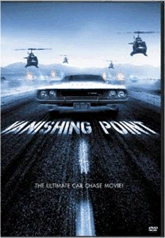Classic “I am Spartacus” car movie ___ 9/10
Review by Brian Wright
Super Soul: This radio station was named Kowalski, in honor of the last American hero to whom speed means freedom of the soul. The question is not when’s he gonna stop, but who is gonna stop him.
Welcome to an original libertarian cult car film. Interestingly, the year of production coincides with the year of founding of the Libertarian Party… which origination isn’t so important in itself, but reveals the early state of consciousness of the modern American (and planetary) libertarian movement. The young freedom movement had many heads: a minority one was explicitly antiwar, antiestablishment, and antiauthoritarian—the sense of life conveyed in full measure in Vanishing Point.
Directed by Richard C. Sarafian
Screenplay by Guillermo Cabrera Infante
Story outline by Malcolm Hart
Barry Newman … Kowalski
Cleavon Little … Super Soul
Dean Jagger … Prospector
Victoria Medlin … Vera
Paul Koslo … Young Cop
Robert Donner … Older Cop
Timothy Scott … Angel
Gilda Texter … Nude Rider
Kowalski (Barry Newman) is a former cop and, before that, Vietnam war veteran, who leaves the police force for moral reasons… he also seeks solace from a personal tragedy, trying to find refuge in speed of both the amphetamine and automobile variety. He has a job delivering cars cross-country. This particular car, a loaded 1970 Dodge Challenger, he’s made a bet to drive from Denver to San Francisco in less than 15 hours. The job takes on the quality of a mission—from a combination of Kowalski’s inner demons and routine smallminded interventions of the various yokels and constabularies he encounters from the gitgo.
After a while the authorities absorb enough Kowalski-induced indignities that they raise the goal of stopping him into a holy war. The epic conflict between the passionate individualist and an officious collective plays out among the hot highways and small-town eyes of the Southwest, covered seemingly telepathically by the sightless smooth-jive-talking DJ Supersoul (Cleavon Little). Supersoul becomes the voice for Kowalski’s troubled soul, for his hopes and authority-shattered dreams spiraling out of control in an accidental would-be death dance with that same authority.
A lot of footage is devoted to the Challenger’s muscular wheels as they elude and outrun the comparatively feeble police ground resources and even some airborne equipment. But the in-between scenes set the movie apart—from Kowalski’s vivid reminiscences, the Prospector (Dean Jagger) who befriends him in the desert, the bikers and hippies living in places off the beaten path. Kowalski’s conversations fill out the principal character, show his normalcy in the midst of struggle with the Man. Also, the interaction between Supersoul’s people and the redneck-sheriff brigade back in civilization provides an explicitly political flourish.
As with so many creative works that lose their luster in distance from their time of origin, the point of the message of Vanishing Point has dulled over the years. In 1971, Tricky Dick was still president and the Vietnam War was in full swing with one government subterfuge or atrocity after another; indeed, the Pentagon Papers were published that year. As I indicated above, it was also in a real sense the founding of the modern libertarian movement. What made VP so important back in the day was its catharsis via Kowalski, the working out of American society’s (or at least a subsociety’s) post-traumatic stress disorder. It showed, as dramatically as possible, the emotional reality behind the TV imagery and propaganda of the era.
The emotions of Kowalski are authentic: the All-American hero distressed by the powers that be. If he does go down, he’s going to do it on his own terms, dammit. Oh, by the way, Kowalski also has some experience racing cars! [Not too many young men in my generation were unmoved by the car culture, its promise of power, freedom, and, yes, sex. The movie’s audio captures the rumbling excitement of V-8 iron as it launches down the open road. For a guy to sit behind the wheel of a 1970 Dodge Challenger immersed in its pulsing tunnel of energy, then fire it like a bazooka toward a mythic target, was like having carnal relations with the prom queen and winning the Lottery on the same evening.]
These are the sins of the flesh that the authorities and minions of God frown upon, heap copious abuse and restraint toward, outlaw, ban, etc. As a matter of enlightenment, all such acts of individual will and power exist in the world of form—they do not bring inner peace of themselves. Oddly, when all is said and done, that last statement seems to be the theme of the movie: the joys of speed and thunder are of substance—bring true pleasure—only as they signify the integrity of a man. VP also makes a dramatic statement that ‘resistance to tyranny is obedience to God,’ as ol’ Thomas J put it.
I like the vicarious experience in VP of man against the Man. Definitely emotional fuel. Plus the film contains enough symbolism to keep the critics in analysis for decades to come. If you haven’t seen it, the original—there is only one true Vanishing Point movie—you’re in for a genuine A1 treat.
This post has been read 40501 times!


